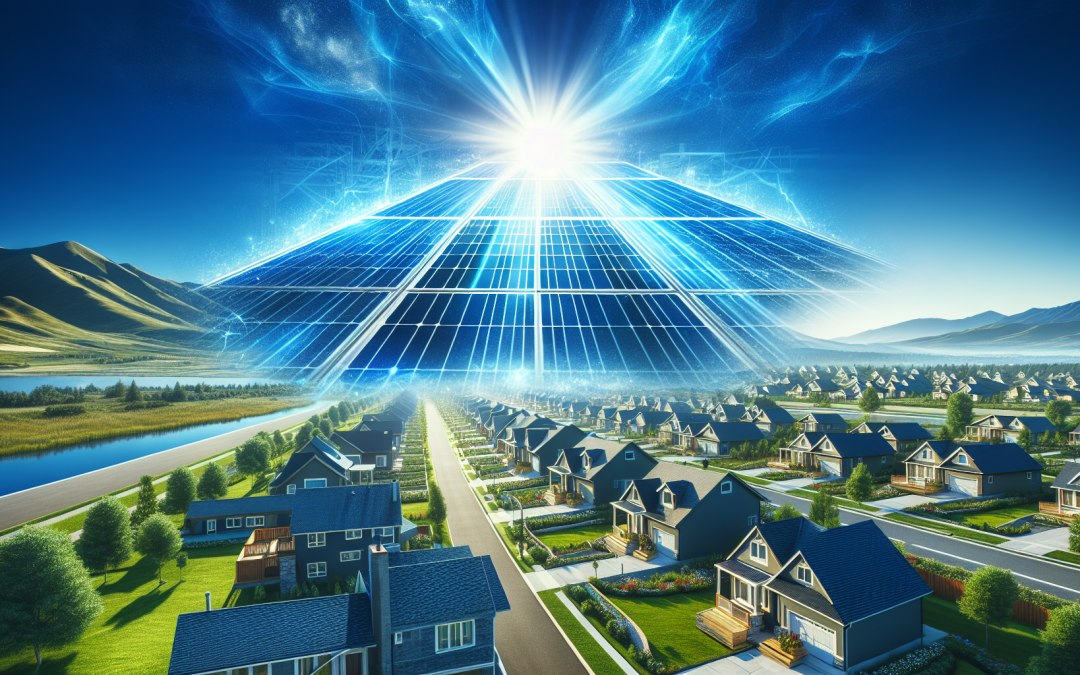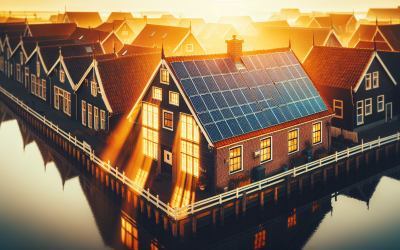So, you’re thinking about installing solar panels on your home, huh? That’s great! Not only will you be able to reduce your carbon footprint and save some money on your energy bills, but you’ll also be contributing to the future of sustainable energy. However, before you start picturing yourself basking in the sun and enjoying the benefits of renewable energy, you might want to consider how your homeowner’s association (HOA) rules could come into play. Yes, that’s right – even your HOA has a say in whether or not you can install those shiny panels on your roof. But don’t worry, we’re here to break it down for you and help you understand how solar panels can potentially impact your HOA rules. It’s time to shed some light on the situation!
Understanding Homeowner’s Associations (HOAs)
What is a homeowner’s association?
A homeowner’s association (HOA) is an organization that governs and manages a residential community, such as a neighborhood or housing development. It is typically created by the developer of the community and consists of homeowners who agree to follow certain rules and pay dues or fees to cover maintenance and other shared expenses. The HOA is responsible for maintaining common areas, enforcing rules and regulations, and promoting a sense of community within the neighborhood.
Why do HOAs exist?
HOAs are created to establish and maintain a certain standard of living within a community. They help protect property values by ensuring that homes are well-maintained, common areas are properly managed, and certain guidelines are followed. HOAs also provide a platform for homeowners to actively participate in the decision-making and management processes of their community. By enforcing rules and regulations, HOAs aim to strike a balance between preserving property values and promoting a harmonious living environment for all residents.
What are the typical rules set by HOAs?
HOAs typically have a set of rules and regulations, known as covenants, conditions, and restrictions (CC&Rs), which are designed to maintain the aesthetic appeal and quality of life within the community. These rules can cover a wide range of topics, including architectural guidelines, landscaping requirements, noise restrictions, pet policies, and parking regulations. The specific rules may vary depending on the community, but they are binding on all homeowners within the HOA. Violation of these rules can result in fines, penalties, or other enforcement actions by the HOA.
The Impact of Solar Panels on HOA Rules
Can I install solar panels in an HOA?
Yes, you have the right to install solar panels on your property, even if you live in an HOA. However, the process and guidelines for installation may vary depending on the specific HOA’s rules and regulations. It is important to review your HOA’s CC&Rs and understand any restrictions or guidelines related to solar panel installation. Some HOAs may have specific requirements for the design, placement, or appearance of solar panels to maintain the visual harmony of the community.
What are the common concerns raised by HOAs regarding solar panels?
HOAs often have concerns about the visual impact of solar panels on the community’s aesthetics. They may worry that panels will be unsightly, altering the community’s overall appearance or diminishing property values. HOAs may also have concerns about potential damage to roofs or common areas during installation, as well as potential liability issues. Additionally, some HOAs may be unfamiliar with the technology and have concerns about maintenance, warranties, and the longevity of solar panel systems.
How do HOAs regulate the installation of solar panels?
HOAs typically have a process in place for homeowners to request approval for solar panel installation. This process often involves submitting an application or request to the HOA, providing detailed plans and specifications for the proposed system. The HOA will then review the request based on its CC&Rs and architectural guidelines. Some HOAs may have specific design criteria or require the use of certain materials to ensure the panels blend well with the community. It is important to understand and follow the HOA’s guidelines to ensure a smooth approval process.
Legal Protection for Solar Panel Installation
State laws supporting solar panel installation
Many states have enacted laws to protect homeowners’ rights to install solar panels despite potential restrictions imposed by HOAs. These laws, known as solar access or solar rights laws, vary by state but generally ensure that HOAs cannot unreasonably restrict or prohibit solar installations. Some states have established a streamlined approval process for homeowners, allowing for expedited review and approval of solar panel requests. Homeowners should familiarize themselves with their state’s laws to understand their rights and protections.
Federal laws protecting homeowners’ rights to install solar panels
The federal government also recognizes and supports homeowners’ rights to install solar panels. In 1978, the U.S. Congress passed the Solar Rights Act, which prohibits any deed restrictions, such as those imposed by HOAs, from effectively preventing the installation of solar energy systems. Additionally, the Federal Housing Administration (FHA) and the Department of Veterans Affairs (VA) have issued guidelines that prohibit certain restrictions on solar panel installations for homes with FHA or VA loans. These federal protections help ensure that homeowners across the country have the opportunity to benefit from solar energy.
HOA restrictions on solar panels – what is fair and what is not?
While HOAs have the authority to regulate the installation of solar panels, there are limits to what restrictions they can impose. Any restrictions imposed by an HOA must be “reasonable” and cannot unduly hinder a homeowner’s ability to go solar. For example, requiring that solar panels be installed on the rear of a home or in an inconspicuous location may be considered reasonable. Conversely, completely banning solar panels or imposing excessively burdensome design requirements may be deemed unreasonable and in violation of state or federal laws. It is essential for HOAs to strike a balance between maintaining community standards and respecting homeowners’ rights to harness solar energy.
Navigating the HOA Approval Process
Understanding the architectural review process
The architectural review process is an essential step in obtaining approval for solar panel installation within an HOA. This process is typically meant to ensure that any modifications or additions to a property comply with the community’s aesthetic guidelines. To navigate this process successfully, it is important to thoroughly read and understand the HOA’s architectural guidelines. These guidelines may include requirements related to panel placement, color, design, or materials. Following the guidelines and submitting a well-prepared application can increase the chances of obtaining swift approval for your solar project.
How to submit a solar panel installation request
To submit a solar panel installation request, homeowners should start by obtaining the necessary approval forms or application from their HOA. It is important to gather all required documentation, including plans, specifications, and any other supporting materials requested by the HOA. Clearly explain the potential benefits of solar energy and demonstrate how the proposed installation will comply with the HOA’s guidelines. Promptly provide any additional information or clarifications requested by the HOA to ensure a smooth application process.
Appealing an HOA’s decision
If an HOA denies a solar panel installation request, homeowners have the right to appeal the decision. The specific appeals process may vary depending on the HOA’s bylaws and governing documents. Typically, homeowners can submit a written appeal stating their case and addressing any concerns raised by the HOA. It may be helpful to gather supporting documentation or expert opinions to strengthen the appeal. Some HOAs may have an appeals committee or board that reviews and decides on appeals. If the appeal is unsuccessful, homeowners may need to consider legal action or alternative dispute resolution methods.
Important Factors to Consider
Evaluating your property’s solar potential
Before proceeding with a solar panel installation, it is essential to evaluate your property’s solar potential. This involves assessing the amount of sunlight your property receives throughout the year and identifying any potential shading issues, such as nearby trees or buildings. Conducting a solar feasibility study or consulting with a solar energy professional can provide insights into your property’s solar potential and help determine if solar panels are a viable option for you.
Choosing the right solar panel system
Selecting the right solar panel system for your needs is crucial to maximizing the benefits of solar energy. Consider factors such as system size, efficiency, durability, and warranty when choosing a solar panel system. It is also important to research reputable solar panel manufacturers and installers to ensure the quality and reliability of the system. Consulting with a professional solar installer can help you navigate the options and choose a system that best suits your property and energy goals.
Financial implications and incentives
Installing solar panels can have a significant financial impact, both in terms of upfront costs and long-term savings. Homeowners should carefully consider the costs associated with purchasing and installing solar panels, as well as any available incentives or financing options. Researching federal and state incentives, such as tax credits or rebates, can help offset the initial investment. Additionally, exploring financing options, such as solar loans or leases, can make solar energy more accessible and manageable for homeowners. Assessing the financial implications and seeking professional advice can help homeowners make informed decisions about going solar.
Educating and Communicating with Your HOA
Building a case for solar panels
When approaching your HOA about installing solar panels, it is crucial to build a strong case that addresses any concerns they may have. Present a well-researched proposal that highlights the environmental and financial benefits of solar energy. Emphasize how solar panels can contribute to the community’s sustainability goals and reduce energy costs for individual homeowners. Provide examples of other HOAs or communities that have successfully embraced solar energy to demonstrate its feasibility and benefits.
Addressing common misconceptions
HOAs may have misconceptions or misunderstandings about solar energy that can hinder approval for solar panel installation. Addressing these misconceptions through clear, concise, and factual information can help dispel any concerns. For example, educate the HOA about advancements in solar panel technology that make today’s systems more efficient and aesthetically pleasing. Provide information about how solar panels can actually enhance property values and contribute to a positive community image.
Working with your HOA to find mutual solutions
It is important to approach your HOA with a mindset of collaboration and finding mutual solutions. Show a willingness to work with the HOA to address any concerns or explore compromises that meet both parties’ needs. For example, consider alternative panel placements or designs that maintain the community’s visual harmony while still harnessing solar energy. Engage in open and respectful communication with the HOA, keeping in mind that cooperation and compromise are essential in reaching a resolution that benefits all stakeholders.
Resolving Disputes with HOAs
Mediation and alternative dispute resolution
If a dispute with your HOA arises regarding solar panel installation, mediation or alternative dispute resolution (ADR) can be an effective way to find a resolution outside of the court system. Mediation involves a neutral third party who helps facilitate communication and negotiation between the homeowner and the HOA. ADR methods, such as arbitration or negotiation, can also be used to reach a mutually acceptable agreement. These processes can be less adversarial and costly compared to traditional litigation, allowing for a more collaborative resolution.
Legal action against unfair HOA restrictions
In some cases, homeowners may need to resort to legal action if an HOA’s restrictions on solar panel installation are deemed unfair or in violation of applicable laws. It is important to consult with an attorney experienced in HOA and solar energy matters to determine the best course of action. Legal action can include filing a lawsuit against the HOA to challenge the restrictions or seeking injunctive relief to prevent enforcement of the restrictions. While legal action should be a last resort, it can be a necessary step to protect homeowners’ rights and ensure fair treatment.
Solar Energy Benefits for HOAs
Reduced electricity bills for common areas
Implementing solar energy in common areas can lead to significant cost savings for HOAs. Solar panels can generate clean and renewable electricity, reducing the reliance on the grid and lowering utility bills. By using solar energy to power amenities such as clubhouses, pools, or outdoor lighting, HOAs can allocate resources to other community needs or reserve funds for future projects. The financial benefits of solar energy can contribute to the overall financial health and stability of the HOA.
Enhanced property values
Solar energy is increasingly valued by homebuyers as an attractive feature. Studies have shown that homes with solar panel systems tend to have higher property values and sell faster compared to homes without solar. By allowing solar panel installations and promoting the use of renewable energy, HOAs can enhance the desirability of the community and potentially increase property values for all homeowners. This can create a positive cycle of attracting new residents and fostering a sense of pride and investment in the community.
Promoting environmental sustainability
HOAs have the opportunity to lead in environmental sustainability by embracing solar energy. By encouraging and facilitating the installation of solar panels, HOAs can reduce the community’s carbon footprint and help combat climate change. Solar energy is clean, renewable, and significantly reduces greenhouse gas emissions compared to traditional energy sources. By actively promoting and supporting solar energy, HOAs can contribute to a more sustainable future and set an example for other communities to follow.
Success Stories: HOAs Embracing Solar
Examples of HOAs supporting solar panel installations
Several HOAs across the country have successfully embraced solar energy and supported homeowners’ right to install solar panels. For example, the Summerlake neighborhood in Winter Garden, Florida, implemented a solar energy project that powers its amenities and common areas. The HOA partnered with a solar energy company to install solar panels, reducing electricity costs and promoting sustainable living. Similar success stories can be found in communities nationwide, showcasing how HOAs can proactively embrace solar energy for the benefit of homeowners and the environment.
Learning from positive experiences
HOAs considering incorporating solar energy can learn from these success stories and the experiences of other communities. Conducting case studies, hosting workshops, or inviting guest speakers from HOAs with successful solar projects can provide valuable insights and guidance. Learning about the specific challenges, solutions, and outcomes of these projects can help HOAs make informed decisions and develop strategies to overcome potential obstacles. By leveraging the knowledge and experiences of others, HOAs can navigate the process of embracing solar energy more effectively and efficiently.
Conclusion
Understanding the impact of solar panels on HOA rules is vital for homeowners who want to harness the benefits of solar energy. While HOAs have the authority to regulate solar panel installations, they must do so in a reasonable and fair manner. Homeowners can navigate the HOA approval process by educating themselves about the rules and guidelines, building a strong case for solar panels, and working collaboratively with the HOA. State and federal laws protect homeowners’ rights to install solar panels, and dispute resolution methods can help resolve conflicts. Ultimately, embracing solar energy can benefit HOAs by reducing electricity costs, enhancing property values, and promoting environmental sustainability. By learning from success stories and coming together as communities, HOAs have the opportunity to lead the way towards a greener future.









